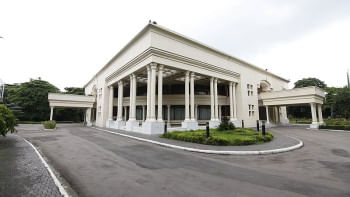Why climate change mitigation matters for Bangladesh
BANGLADESH'S leaders and people are perhaps amongst the most aware about the problems and risks of human induced climate change. The prime minister and many ministers are well aware of the dangers of climate change to Bangladesh, and all ministries are now taking actions to tackle climate change impacts in their own ways. This is equally true for our parliamentarians, our research community as well as NGOs, and certainly for the media. Perhaps the main stakeholder group that has not taken much interest, so far, is the private sector. Indeed, Bangladesh has not one but two major climate change funds that have already disbursed around half a billion US Dollars towards tackling climate change around the country.
This awareness of climate change is largely because of Bangladesh's vulnerability to climate change. Most of the actions have been undertaken to support adaptation measures to manage the risks of adverse impacts due to climate change, with only a few measures to reduce emission of greenhouse gases (GHG) by mitigation. While this has indeed been the correct approach for Bangladesh's actions at home, where adaptation is much more important than mitigation, I will argue here that in a global sense mitigation is in fact far more important than adaptation and further advocate that Bangladesh should redouble its efforts to get a global agreement that enhances mitigation efforts by all countries around the world.
Synthesis Report of IPCC
The Intergovernmental Panel on Climate Change (IPCC) just recently released the Synthesis Report of its Fifth Assessment, which brings together the messages from Working Groups One (on climate science), Working Group Two (on vulnerability, impacts and adaptation) and Working Group Three (on responses), and completed the set of four reports of the IPCC's Fifth Assessment. The message from the scientific community is loud and clear, that GHG emissions (and hence also global temperatures) continue to rise and if not brought down considerably will reach nearly 4 degrees Centigrade by the end of the century. This will lead to globally catastrophic levels of adverse climate impacts, to which not just Bangladesh but even the rich world will find hard to adapt.
Hence, the IPCC, quite rightly, advised that emission of GHGs needs to be phased out completely by the end of this century, if we wish to keep global temperature rise below 2 degrees Centigrade.
Mitigation versus adaptation
The reason for this is that the lags in the global atmospheric and ocean systems mean that emission of GHG -- for example by burning fossil fuels like coal, petrol and natural gas -- into the atmosphere today will not actually cause the atmosphere to warm for many years. Hence, there is already almost 1 degree of global warming coming over the next two decades due to past emissions of GHGs, and is now inevitable and unavoidable. What is still avoidable are even larger temperature rises, which can be prevented only by mitigation in the longer term. In other words, while adaptation is necessary and must be done in the short to medium term, there is a limit to what can be achieved by adaptation, as it will never bring down the adverse impacts to zero. Only mitigation can bring down adverse impacts of GHGs to zero. Hence, by not emitting a ton of GHG the adverse impacts of that ton have been effectively brought down to zero. But, with even the most effective adaptation measures, there will always be some residual loss and damage.
Hence, while Bangladesh is right to focus more on adaptation actions domestically, we also need to make much more efforts to persuade the rest of the world to take stronger mitigation actions than they are doing now.
Climate change negotiations
The main arena where the global talks to combat climate change take place is the United Nations Framework Convention on Climate Change (UNFCCC), which is about to hold its 20th Conference of Parties (COP20) in Lima, Peru, in a few weeks time. This is expected to start the final round of talks toward a new globally binding agreement to be reached at COP21 to be held in Paris, France in December 2015. I have argued before that Bangladesh needs to follow the example of many developed as well as developing countries and appoint a full-time high level special climate change envoy to engage in these (and other) global talks in a concerted and strategic manner to ensure that we actually achieve an ambitious agreement in Pairs next year. It is vital to Bangladesh's own longer term interests that we do so.
Planning the future of Bangladesh
The government of Bangladesh is currently engaged in preparing its seventh Five Year Plan for the period from 2015 to 2019, and also preparing a one hundred year perspective plan called the Delta Plan with assistance of the Netherlands government. I would argue that while adapting to climate change at home should indeed be the priority in the next five year plan, as far the longer term is concerned it is far more important that the global temperatures be kept to 2 degrees, which requires action by other countries not by Bangladesh at home, (as no amount of adaptation at home will be enough to tackle a global temperature rise of four degrees Centigrade). However, Bangladesh can, and should, play a key role in persuading other countries, both developed as well as developing, to take the mitigation actions that will enable Bangladesh's domestic adaptation actions to be effective in the longer term.
Hence, investment in climate change diplomacy to persuade the rest of the world to take mitigation actions is as much a priority for Bangladesh as adaptation at home.
The writer is Director, International Centre for Climate Change and Development, Independent University, Bangladesh.
E-mail: [email protected]

 For all latest news, follow The Daily Star's Google News channel.
For all latest news, follow The Daily Star's Google News channel. 



Comments